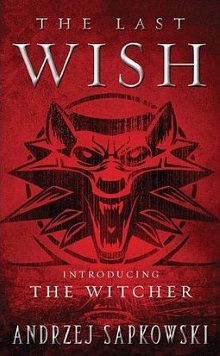
After finishing The Witcher 3 and getting a better idea of the story of Geralt and Yennefer, I thought I’d give the book series the games were based on a go. I remember looking into the series back when the first game was released but I recall that the English versions weren’t ready yet. The whole thing consists of two collections of short stories and a series of five novels by Polish author Andrzej Sapkowski. The Last Wish is chronologically the earliest of the various works and indeed the English edition was only published in 2007, more or less at the same time as the first game.
This one contains six distinct stories, with a separate frame story linking them together. The most famous of these is simply titled The Witcher. Those who have played the first game will know of it as it was used as the basis of the opening cinematic and Geralt even has to repeat the feat of dealing with the princess turned striga as a quest in the game but it feels great to actually read how he goes about it as a true professional. The other stories here are no less important, recounting such core events as Geralt and Dandelion’s first adventure together; how Geralt earned the moniker the Butcher of Braviken; his role in Ciri’s conception while saving Duny, now known as Emhyr var Emreis in the games, from a curse; and of course his first meeting with Yennefer and the famous, fateful wish. Bits and pieces of all this are scattered through the three games but I found it extremely satisfying to finally get the full story. Even the frame story is significant. It takes immediately after Geralt confronts the striga which left him grievously wounded. He spends weeks recuperating at the temple of Melitele under the care of the priestess Nenneke who is curious about Geralt’s relationships with his companions.
One reason this is such a joy to read is that it feels ever so slightly different from what we usually get in native English language fantasy. There’s no Hero’s Journey here. Geralt starts off as a fully trained and reasonably experienced Witcher. The stories make it clear that he’s incredibly deadly compared to ordinary humans but only about on par with monsters with help of his elixirs. I also like how he has principles, a sense of professional ethics and a great deal of loyalty to his friends, but he’s not an altruistic do-gooder and clearly doesn’t shy away from bloodshed. The world treats violence as commonplace and though human loss of life is deplored, it’s often treated by the various characters as an acceptable cost of doing business. At the same time, there’s a fairy tale-like quality to the stories, not in the cutesy sense, but in the sense that the narrative adheres to the primal and dark logic of traditional folklore. Geralt often evinces a skeptical attitude towards folklore which helps make the stories feel modern. But while there are few happy-ever-after endings in these Eastern European-inspired fairy tales, the curses and dark magic are very much real.
The better understanding of the characters that I gained from reading this also caused me to regret conversation options that I made in the last game and appreciate some aspects of the world better. For example, now it makes sense to me why Geralt would never need to bow to Emhyr, emperor of Nilfgaard or not. The story The Edge of the World gives a much better picture of the elves’ fading place in the world and Geralt’s ambivalent attitude towards their tragedy. I was surprised for example with how little pity he has for the elves in that story but it’s hard to argue otherwise when the Goddess of the Fertility that the elves themselves worship seem to favor the humans. Last but not least anyone who has read the story of the first meeting between Yennefer and Geralt wouldn’t be surprised by how abruptly she treats him when players first encounter her in the third game. I feel kind of embarrassed for how he falls heads over heels in love with her pretty much immediately and that more or less sets the tone for their relationship. I consider knowing all this to be essential for any serious fan of the videogame franchise.
Even if it were not for the videogames, it’s easy to see why this series has been so successful. The stories feel adult without being all gritty and angsty. There’s a fairy tale-like magic in the world but of the dark Brothers Grimm variety rather than the modernized ones. Geralt is a protagonist who doesn’t fall easily into the usual hero archetypes and the other characters are just as interesting. The prose as a whole is well written and evocative.. That’s why this is solid recommendation for all fantasy fans whether or not you’ve played the game. I will most certainly be reading the other books in the series.
One thought on “The Last Wish”